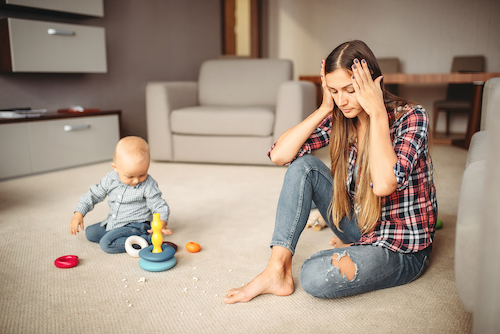 Parenting isn’t always easy. Late nights, mess, noise and sleep deprivation are just some of the challenges to contend with.
Parenting isn’t always easy. Late nights, mess, noise and sleep deprivation are just some of the challenges to contend with.
It gets even harder when the challenges of childcare aren’t evenly shared. Past research has shown that mothers are typically more tired, more stressed and unhappier than fathers. Now researchers have found that may be due to how childcare activities are divided between parents.
“We found that although parents generally enjoy childcare and find it meaningful, moms are less happy, more stressed, and more tired than dads during childcare. Second, we found gender differences in what activities parents do with their kids and circumstances they do those activities in (which we call the care context). Third, we found that the care context matters for parents’ moods and emotions during childcare, i.e. that parents’ moods are related to what they do with their kids and the circumstances they do it in,” Cadhla McDonnell, a doctoral candidate in sociology and demography at Penn State, and author of the study, told Theravive.
“We linked this back to gender differences in moods. Ultimately this allowed us to show that the gender differences in caregiving behavior explain the gender gap in happiness during childcare and some of the gap in stress. They do not explain any of the gap in tiredness, though.”
In undertaking the research, the researchers examined data collected by the US Census Bureau for the American Time Use Survey. The survey had information on over four thousand childcare related activities, as well as details about who performed the tasks and what mood that person had whilst undertaking the activity
The researchers examined the various parenting activities through what they call a “care context”, which analyses activities in five different areas.
“We wanted to capture all the ways that one childcare activity can differ from another. Childcare includes many different tasks, undertaken in a variety of circumstances. We expected parents would report different emotions when feeding a newborn in the middle of the night than they would report during a family trip to watch a child’s soccer match on the weekend, for example. To capture as much of this variation as possible we included measures of the activity type, when and where the activity took place, who else was there and how much childcare was involved. We called this the care context,” McDonnell explained.
The researchers discovered that childcare activities done by fathers were more likely to take place on a weekend, and be recreational. Childcare activities for mothers were more likely to involve an infant and were more likely to be done without another parent present.
Using the care context enabled researchers to explain why mothers and fathers have different levels of happiness, and partially why they had different stress levels.
The care context suggests mothers are doing more childcare activities that are less enjoyable and cause more stress. But the research did not examine why this is. McDonnell argues it is a topic that warrants further exploration.
“We don’t know from our data why mothers and fathers’ childcare activities differ in the ways that they do. I wish we had measures of gender ideology in our data to help us get at this but we didn’t. I definitely think this is an area where we need more research,” she said.
The findings suggest that it isn’t just the number of hours that need to be considered when distributing parenting duties fairly, but also the kind of tasks to be undertaken.
“The gendered nature of childcare brings more emotional rewards for fathers than for mothers. Our research shows that, for couples, achieving equal emotional rewards requires more than just looking at how much time each parent contributes (though that is undoubtedly important) but also considering what each parent does and the circumstances they do it in,” McDonnell said.
“I believe that more equal sharing would ultimately benefit both partners. Recent research on housework shows that couples who share housework more fairly are more satisfied with their relationships and have more sex. I don’t know of any study that tests the same idea for childcare but I expect we would see similar results.”
Elizabeth Pratt is a medical journalist and producer. Her work has appeared on Healthline, The Huffington Post, Fox News, The Australian Broadcasting Corporation, The Sydney Morning Herald, News.com.au, Escape, The Cusp and Skyscanner. You can read more of her articles here. Or learn more about Elizabeth and contact her via her LinkedIn and Twitter profiles.